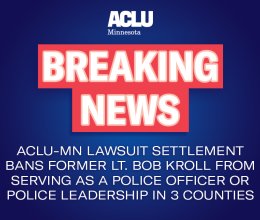
Minneapolis Police Department announces changes to body camera policy.
Contact: Aliya Khan, akhan@aclu-mn.org, 651-644-5264, 812-230-4241 (cell)
St. Paul, Minn –Police Chief Medaria Arradondo of the Minneapolis Police Department and Minneapolis Mayor Jacob Frey announced body camera policy reforms early yesterday. The policy changes include a number of encouraging updates, including measures to prevent miscategorization of body camera case numbers and a matrix to refine their discipline procedure. The policy also includes rollbacks to previous changes made by Chief Arradondo last summer. Teresa Nelson, legal director of the American Civil Liberties Union of Minnesota, issued the following statement:
Last summer, we applauded then-Interim Police Chief Arradondo when he announced reforms that would require officers to activate body cameras at dispatch and require stricter minimum discipline for failure to comply. The new policy only requires officers to activate their body cameras two blocks away rather than at dispatch, and, in some instances, has lessened the minimum discipline for noncompliance.
One explanation for the change in the activation policy is the large amount of footage that is being collected while officers drive to calls. We are mindful of data storage issues; however, there will always be trade-offs when implementing technology and we believe that the priority should be on policies that maximize compliance.
While there are also a number of encouraging changes in the policy, we are disappointed that the new policy does not incorporate the recommendations we have made over the past few years—including prohibiting officers’ review of camera footage. And we are deeply concerned that a matrix of discipline is only now being implemented.
This announcement comes on the heels of plans to increase the MPD budget and add police officers. Community members have been clear in calling for largescale, meaningful change. With increasingly tense relationships between community members and police officers in Minnesota and across the country, we are concerned that these reforms do not go far enough.
We hope Chief Arradondo enforces the new policy, but let’s be clear—there was nothing stopping him from enforcing the policy he previously put forth. Chief Arradondo has had plenty of time to ensure compliance and hold officers accountable—what was stopping him?
It is our understanding that these policy changes are accompanied by additional civilian staff who are tasked with compliance monitoring. We hope that this will result in increased compliance and accountability. We also hope that these policy changes will be revisited based on the results of that monitoring.
###


